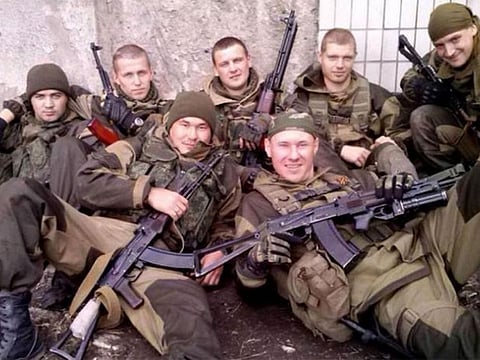The tale of Russian involvement in Libya
Wagner, the hidden player of Russia, attended Haftar-Shoigu meeting

Abu Dhabi
As was the situation in Syria, Russia gradually went on to declare its position regarding the numerous reports about the involvement of the “Wagner Group”, which includes mercenaries from Russia, to fight in Libya, from complete denial in the beginning, and accusing those who publish information about this presence of being involved in “media warfare” and spreading false news aimed at “discrediting Russia”, to acknowledge this existence, from the gateway that these are “Russian citizens, but they are not related to the military”, and that “any Russian citizens, who are active in Libya are outside the government and do not receive salaries from the Russian state according to President Vladimir Putin’s statement. After that, the Kremlin spokesman, Dmitry Peskov, said it is undeniable that there are “Russian mercenaries” fighting in Libya, and “in this country there are mercenaries from many countries.”
Reports were increasing about the role that Wagner fighters play, especially in some decisive confrontations in a number of regions, before they finally received a strong blow near the Libyan capital, which resulted in their losing a strategic location near an airport they were stationed in, which necessitated the announcement that about 1500 of them withdrew from the region, and they were transported to other countries on Antonov planes, headed to Libya for this purpose, in preparation for their return to Russia
Remarkably, in the wake of these reports, data emerged from Russian media sources indicating that in reality, Russian mercenaries were not evacuated from Libya, but rather were transferred to areas in the south of the country, far from the current confrontation lines around the capital. In any case, Moscow remained silent about these reports, and did not issue confirmation or denial of their authenticity, but a source close to the Russian Foreign Ministry pointed out in an interview to Al Sharq Al Awsat that “the reports about Russia’s transfer of these mercenaries were inacurate”, indicating that the Russian government has nothing to do with them, and that “whoever sent them were the ones, who moved them” in reference to private paramilitary companies operating under contracts with foreign entities.
Also, Moscow avoided commenting on the official level, on a UN report that spoke about the involvement of the “Wagner” group in Libya. The report estimates the number of group members present in Libya to be between 800 and 1,000. The 57-page report states that the group’s operatives have been operating in Libya since October 2018, providing technical assistance to repair military vehicles and participating in military operations.
The elements of the group worked in the artillery, monitoring and sniping units, and provided technical assistance in electronic operations. Most members of the group, according to the UN report, are from Russia, but there are among them elements from Belarus, Moldova, Serbia and Ukraine.
On the other hand, the Russian media does not hide that those behind the groups and finance their activities are Russian businessman Yevgeny Prezhugin, who is close to the Kremlin, and the Ministry of Defense, and his name was associated with sending these fighting groups to Ukraine, Syria and other countries, especially in Central Africa.
It is noteworthy that Prezhugin appeared in some pictures taken by journalists during a meeting of the Russian Defense Minister Sergey Shoigu with the commander of the National Army in Libya, Field Marshal Khalifa Haftar during a visit to the latter to Moscow in 2018, and some consider that this visit was the main station to agree to start sending fighters « Wagner »to Libya.
Since then, the activity of this group has remained hidden in Libya, and runs parallel to the public activity of the Russian military, which has repeatedly declared that it is committed to UN resolutions on the arms embargo to Libya, but at the same time stressed that it is implementing “previous contracts” related to the supply of maintenance equipment and spare parts to the Libyan army, but not weapons.


